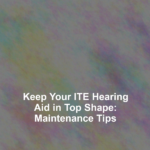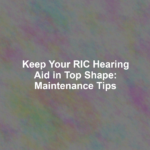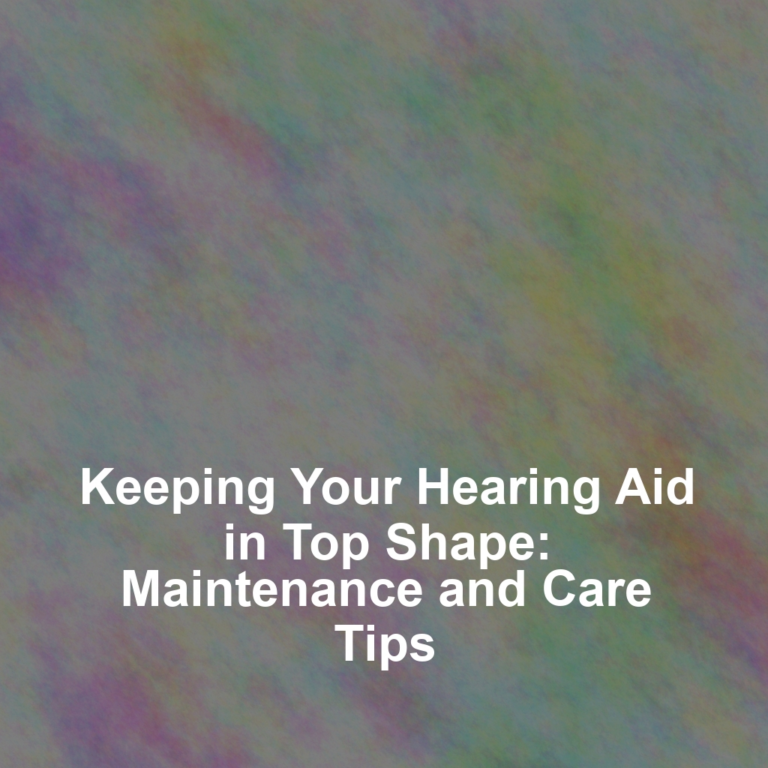Navigating the world with a CIC (completely in canal) hearing aid should be as seamless as a fish gliding through water, but without proper maintenance, itG??s easy for your device to become more of an anchor than an aid.
YouG??ve invested in your auditory companion, and itG??s essential to keep it in pristine working condition. From knowing the ins and outs of your daily cleaning routine to understanding the nuances of moisture prevention, thereG??s a symphony of simple steps that can extend the life of your hearing aid.
YouG??ll want to stay tuned for the tips on battery care to ensure youG??re never caught off guard by a sudden silence, and the importance of regular sound quality checks canG??t be overstated. And while you can do a lot on your own, donG??t overlook the value of a professional care schedule.
So, letG??s explore how you can keep your device performing its best, ensuring that the world sounds as rich and clear as itG??s meant to be.
Daily Cleaning Routine
To ensure your CIC (completely in canal) hearing aid performs optimally, itG??s essential to establish a daily cleaning routine. Every night, after youG??ve removed the device, gently wipe the exterior with a dry, soft cloth to remove earwax and debris. DonG??t use water or solvents, as they can damage the aid.
Pay special attention to the microphone ports and sound outlet. Use the brush provided by your hearing aid manufacturer to dislodge any wax or particles that might be blocking the sound path. Be careful not to insert anything into the sound outlet to avoid damaging the delicate components inside.
If your CIC hearing aid comes with a wax guard, check it daily. Wax accumulation can quickly muffle sound. If you notice a build-up, replace the guard according to the instructions provided.
Lastly, open the battery compartment and remove the battery each night. This not only extends the battery life but also allows any moisture thatG??s accumulated during the day to evaporate. Remember to wash your hands before handling your hearing aid to prevent transferring dirt and oils.
Moisture Prevention Strategies
Having established a daily cleaning routine, youG??ll also need to protect your CIC hearing aid from moisture, which can cause significant damage over time. Remember, your hearing aidG??s delicate internal components are highly susceptible to water damage, which can lead to costly repairs or replacements.
To keep moisture at bay, make sure you remove your hearing aid before showering, swimming, or facing heavy rain. If youG??re someone who sweats a lot, consider using a sweatband or cap to minimize exposure. At night, leave the battery compartment open to air out and place the device in a hearing aid dehumidifier or a dry kit. These specially designed containers absorb moisture and can significantly extend the life of your device.
In humid environments, or during seasons with high moisture levels, be extra vigilant. If youG??ve been out in a damp climate, it might be wise to give your hearing aid a mid-day check to ensure itG??s dry. Should your CIC hearing aid accidentally get wet, remove the battery immediately and place the device in a dehumidifier to dry out completely before using it again. With these preventive strategies, youG??ll keep your hearing aid in top condition, avoiding the pitfalls of moisture damage.
Battery Care and Replacement
Proper battery maintenance is crucial for ensuring your CIC hearing aid functions optimally and lasts as long as possible. To keep the batteries in good condition, youG??ve got to handle them with care and be mindful of when they need changing.
Here are some essential tips for battery care and replacement:
- Turn off your hearing aid when itG??s not in use. This simple step can significantly extend battery life.
- Store batteries at room temperature. Extreme temperatures can reduce battery performance, so avoid storing them in hot or cold places.
- Check the expiration date. Using fresh batteries is essential for optimal performance. DonG??t use batteries past their expiry as they may not provide a reliable power source.
- Handle with clean, dry hands. Moisture and grease from your fingers can damage the battery and the hearing aid.
When itG??s time to replace the batteries, make sure you dispose of the old ones responsibly. Many places offer recycling programs for batteries, which is a much better option than throwing them in the trash. Remember, your hearing aid depends on a consistent power source, and taking good care of the batteries is an integral part of that.
Sound Quality Checks
While ensuring your CIC hearing aid has fresh batteries is key, regularly checking the sound quality can help you catch and address any audio issues early on. YouG??ll want to be proactive about this to ensure your hearing experience remains optimal. Start by finding a quiet environment to test the sound. Listen for any static, crackling, or distortion that could indicate a problem. If the sound isnG??t clear, itG??s time for some troubleshooting.
First, check the microphone and sound outlet for any blockages. A simple brush or a gentle wipe with a dry cloth can remove debris that might be affecting sound quality. DonG??t forget to look at the wax filter; it can become clogged over time and may need replacing. If the sound is still not up to par, adjusting the volume or program settings might do the trick. Your hearing aid may have come with a tool for making these adjustments.
If these steps donG??t resolve the issue, itG??s best to consult with your audiologist. They can run more sophisticated tests and determine if thereG??s a deeper issue at play. Remember, keeping up with sound quality checks will save you from unwanted surprises and maintain the longevity of your CIC hearing aid.
Professional Care Schedule
How often should you schedule professional maintenance for your CIC hearing aid to ensure its optimal performance? Well, you wouldnG??t neglect your carG??s service appointments, so donG??t skip out on the professional care needed for your hearing aid. Generally, itG??s recommended to visit your audiologist or hearing aid specialist at least once a year for a thorough check-up and maintenance. However, depending on your lifestyle and how much wear and tear your device goes through, you might need to go more frequently.
HereG??s a quick guide to help you determine your professional care schedule:
- Annual Check-up: At a minimum, have a professional check your hearing aid annually.
- Every 6 Months****: If youG??re active or spend a lot of time outdoors, consider biannual visits.
- After Exposure to Extremes: If your hearing aid is exposed to moisture or extreme temperatures, get it checked out.
- When Performance Drops: Any noticeable decline in performance is a sign to schedule a visit.
Conclusion
Keep your CIC hearing aid in top condition with regular upkeep. Gently clean it daily, safeguard it from moisture, and change batteries promptly.
Regularly check the sound quality and donG??t skip your professional care appointments. With these simple steps, youG??ll ensure your device works flawlessly, keeping you connected to the world around you.
Remember, a little maintenance goes a long way in extending your hearing aidG??s life and performance.











